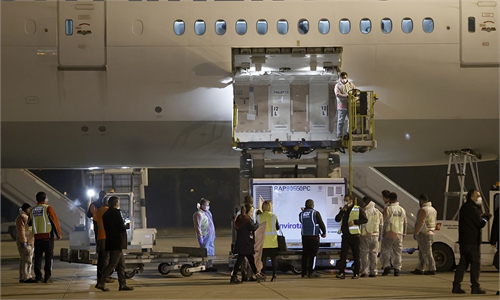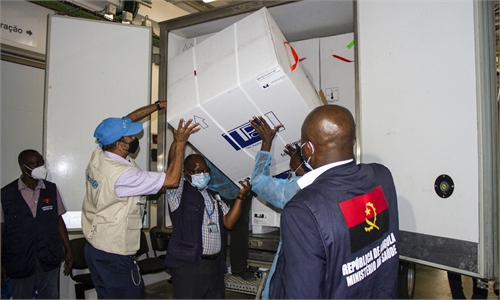IN-DEPTH / IN-DEPTH
China has key role to play in innovation, promotion of vaccines as global public good: Gates Foundation
Editor's Note:
As the pandemic ravages the world, vaccination inequality poses another major hurdle in the global effort to contain the virus. To advance the vaccination rate in developing countries, WHO-backed COVAX is ramping up efforts to help people in marginalized regions. The Bill & Melinda Gates Foundation also plays an important role in this cause. Is there a solution to the global immunization inequality? Should China and the US cooperate on promoting COVAX? Global Times reporter Xie Wenting (GT) interviewed Gargee Ghosh (Ghosh), president of Global Policy & Advocacy at the Bill & Melinda Gates Foundation on those topics.
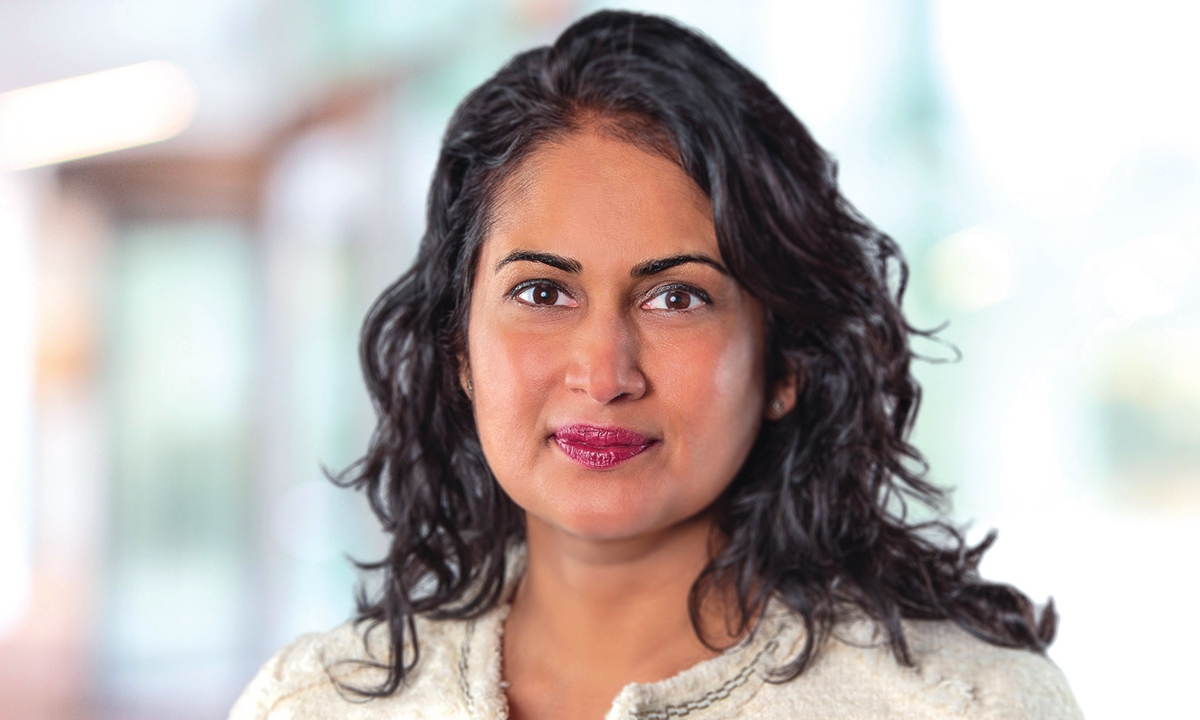
GT: What's the latest situation on COVID-19 immunization inequity? How big is the problem? Are you confident that the world will have a solution?
Ghosh: The pandemic has laid bare the stark inequalities that plague our education, health, and economic systems both nationally and globally. In 2020, we witnessed historic success in developing COVID-19 vaccines faster than ever before. But we've so far fallen short of the vision for equitable access to these vaccines. Of the first 128 million doses administered, three-quarters went to people living in just 10 countries.
Access challenges in a pandemic are unique, as both higher-income and lower-income countries are affected, albeit in different ways. If we want to end this global pandemic, we need to know who is most at risk and focus on ensuring they have the tools and support needed to keep themselves healthy and safe, including access to safe and effective vaccines and treatments.
We believe that the only way to bring this pandemic to an end is for diagnostics, treatments, and vaccines to be affordable and available globally. Globally, we all need to work together to help make sure that low- and middle-income countries are not left behind. While high-income countries have been able to advance purchase vaccine supply, many low- and middle-income countries, which are home to nearly half of all global population, do not have the purchasing power to do the same to protect their populations. Gavi's COVAX Advance Market Commitment has ensured that safe and effective vaccines will be made available to low- and middle-income countries, and the first doses are now being delivered.
Leaving half the world without access to COVID-19 vaccines only means that more people will suffer and die. Donor countries would actually get an estimated $466 billion worth of economic benefits over the next five years if they support equitable access to vaccines.
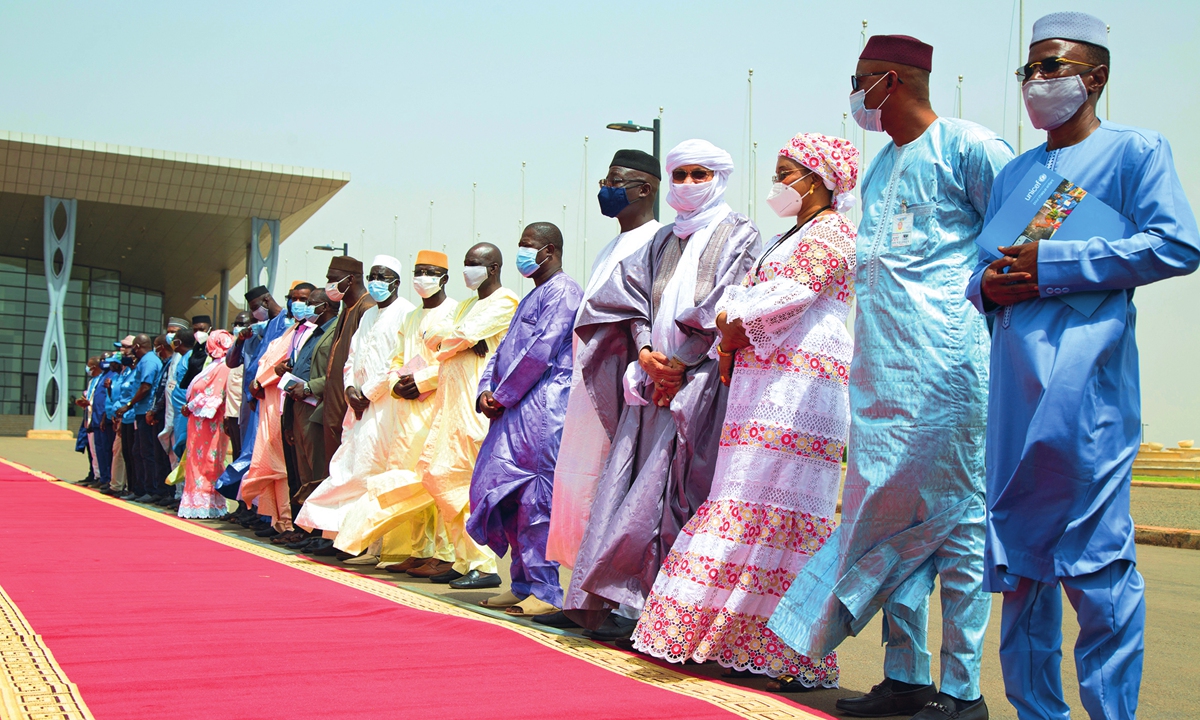
Ghosh: In order to help us achieve a global breakthrough, we must increase our investments in multilateral cooperation mechanisms and ensure the continued innovation and promotion of global public goods. China has an important role to play in this work. And the foundation is committed to supporting China in that regard.
Since the outbreak of COVID-19, we've been working closely with a range of public and private sector partners in China to support their response work both in China and globally.
Ending this pandemic will require multiple safe and effective COVID-19 vaccines, and our foundation is committed to supporting China's potential contribution through COVAX. Any Chinese vaccine that meets international standards could be a helpful contribution to the world.
As we look ahead to 2021, the foundation remains committed to supporting our Chinese partners in tackling the ripple effects of COVID-19, while continuing to make progress on our key long-term programs, such as combating HIV and tuberculosis, strengthening China's national immunization program, improving primary healthcare and child nutrition in rural areas, and facilitating the sharing of China's experience and expertise in malaria control and agricultural development with Sub-Saharan African countries.
GT: How should the US and China cooperate on promoting COVAX to ensure the equity of vaccination globally?
Ghosh: International cooperation and global partnerships make the world a better and more secure place for people everywhere, especially the most vulnerable and all countries should have an interest in promoting a globally equitable solution to the pandemic.
Modeling by Northeastern University shows that if the first 2 billion doses of COVID-19 vaccines go to rich countries instead of all countries equitably, the total number of deaths could double and the pandemic will last months longer.
Analysis by Eurasia Group underscores that much of the global economy will not recover unless vaccines are distributed in large numbers to low- and lower-middle-income countries. Donor countries would actually experience economic benefits of $466 billion over the next five years if they support equitable access to vaccines.
I think it is important that all countries collaborate to help people everywhere thrive and lead healthy, productive lives. And there is no situation more critical than a pandemic that requires global cooperation.
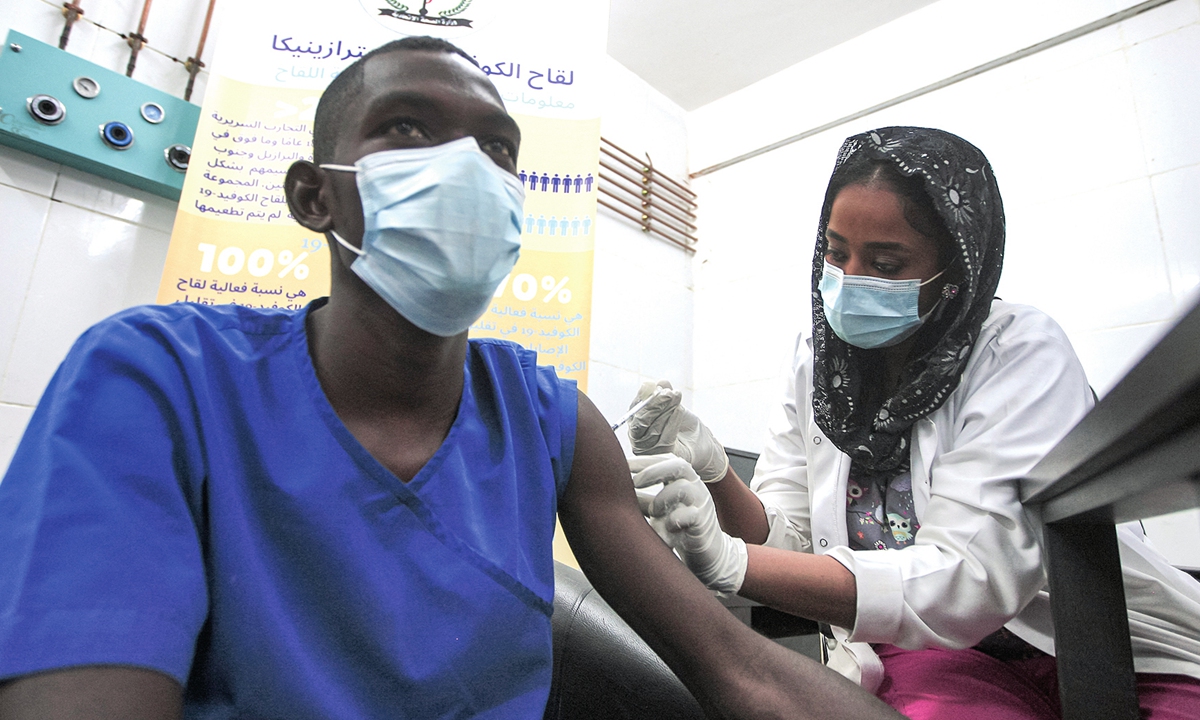
GT: How can COVAX facilitate more equitable distribution of COVID-19 vaccines?
Ghosh: The resources needed to combat this pandemic are beyond the resources of one organization. We need all sectors - from governments to civil society, to foundations, and the private sector - to step up and play their role. A global response is required to end a global pandemic, which means making sure that at-risk populations around the world have access to safe and effective vaccines. COVAX offers the best option to achieve this.
COVAX has made considerable progress, shipping 29 million COVID-19 vaccines to 46 countries and regions (as of March 10), and supply is expected to increase significantly in the months ahead. But many countries still see no path to large-scale vaccination until the latter half of the year or into 2022.
COVAX remains far and away the biggest and most important multilateral initiative to tackle this challenge, but only if it urgently receives funding to secure enough vaccines to outrace the virus. COVAX is currently on track to deliver at least 2 billion doses this year, with 1.3 billion going to low- and lower-middle-income countries via the COVAX Advance Market Commitment (AMC). With additional funding of at least $2 billion this year, the COVAX AMC could secure an additional 500 million doses for AMC economies, allowing these countries to get closer to 30 percent population coverage.
GT: Can you brief us on the latest status of the Gates Foundation's involvement in the COVAX Facility? What does the Gates Foundation want to achieve under COVAX?
Ghosh: COVAX is co-led by Gavi, the Coalition for Epidemic Preparedness Innovations (CEPI), and the World Health Organization, alongside key delivery partner UNICEF. The foundation is working on multiple fronts to speed up the development, manufacturing, and delivery of COVID-19 tools, complementing the work of COVAX.
We committed $156 million to Gavi's COVID-19 Vaccine Advance Market Commitment (COVAX AMC), to finance COVID-19 vaccines for lower-income countries. This funding is supporting the procurement of doses for low- and lower-middle-income countries within the Facility. Thanks to generous contributions from many governments and donors, COVAX is on track to deliver at least 2 billion doses of COVID-19 vaccines this year, including at least 1.3 billion doses for AMC economies.
As a partner in the Access to COVID-19 Tools Accelerator (ACT-A), we are working with governments, non-profits, global and public health agencies, and the private sector to mobilize the necessary resources to research, develop, manufacture, and ensure equitable and effective access to new diagnostics, therapeutics, and vaccines.
We also collaborated with Gavi and the Serum Institute of India to finance at-risk manufacturing of up to 200 million doses of either Novavax or AstraZeneca's vaccine candidates for low- and middle-income countries via Gavi's COVAX AMC.
We see our unique role as helping reduce barriers for these countries and leveraging our resources to ensure low- and middle-income countries (LMIC) and other vulnerable populations have a fair shot. However, we also know that this is not a problem that philanthropy alone can solve. We encourage governments to engage at a larger scale and provide the needed funding to support enough vaccines to outrace the virus, and to support COVAX as the vehicle to achieving that goal.
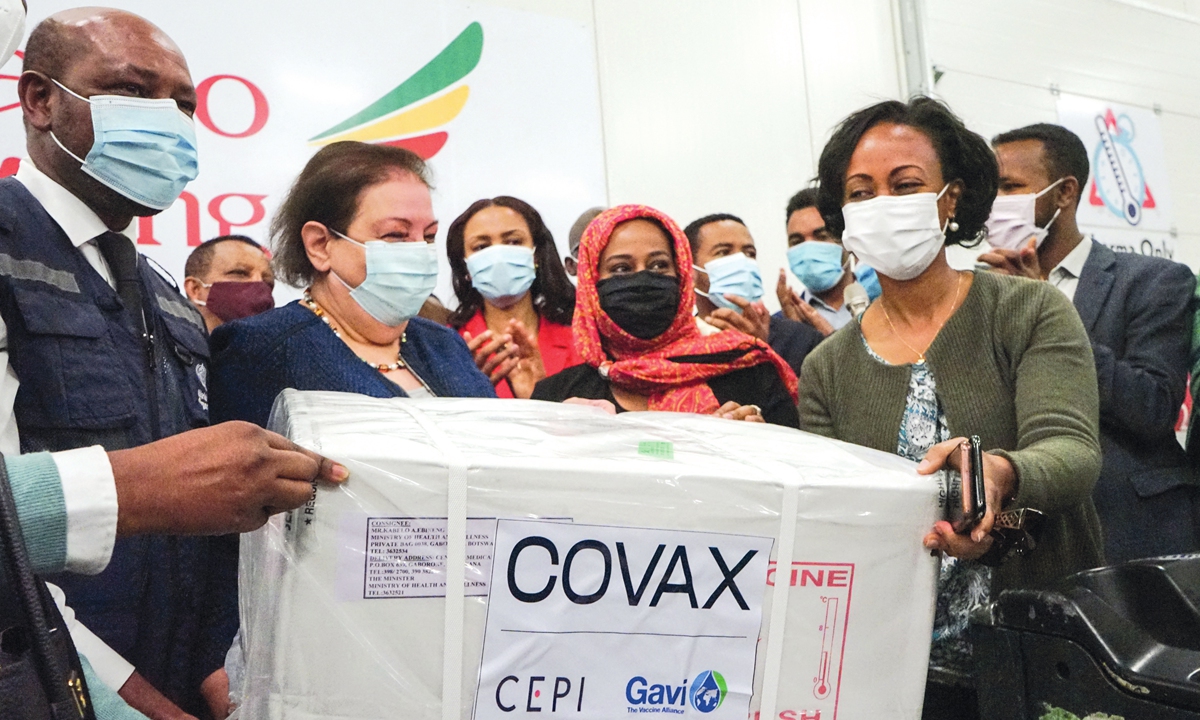
GT: How can the world be better prepared for the next pandemic?
Ghosh: The path forward is challenging but not bleak. We have an opportunity to learn from the first year of the pandemic and close the gap on equitable access to COVID-19 vaccines. Countries must resist the urge to retreat inward and redouble commitments to a global approach.
The world has learned a lot about what it will take to be ready for the next pandemic:
Vaccine Development: The pandemic has demonstrated what's possible in terms of accelerating the safe development of effective vaccines. New technologies and platforms could be game-changers when applied to existing diseases like HIV and malaria (investments which China have been actively engaged in), reducing the burden of those killers.
Innovation - We have seen everyone from scientific researchers to global health organizations to frontline workers innovating to respond to COVID-19 as effectively as possible. Research & development is happening faster than ever before.
In particular, the most promising platforms for supporting long-term product innovation need to be invested in and strengthened (e.g., strengthening CEPI as a platform for preparedness innovations).
Partnerships - Global health organizations like the Global Fund and Gavi, the Vaccine Alliance are forging new partnerships to make sure innovations can reach people everywhere - not just the wealthy few. Frontline workers are iterating on safety protocols every day. But after this sense of emergency has passed, countries must continue working together to build and maintain a permanent infrastructure for epidemic preparedness and response.
Strengthened health systems - At the country-level, strengthening health systems so healthcare workers can do the day-to-day work of prevention and treatment. Around the world, it will mean investing in cutting-edge disease detection and the capability to research, develop, and manufacture billions of doses of safe and effective treatments and vaccines.
We cannot try to do this on the cheap, and we cannot do it country by country. It will cost billions of dollars from across all sectors to be ready for the next pandemic, but we are seeing now how not making those investments costs the world many trillions in the long run.
If COVID-19 has taught the world anything over the past year, it is that we are all in this together. Variants may continue to emerge that could put everyone at risk. We cannot defeat this pandemic unless everyone, everywhere, has a chance to get vaccinated.
As the pandemic ravages the world, vaccination inequality poses another major hurdle in the global effort to contain the virus. To advance the vaccination rate in developing countries, WHO-backed COVAX is ramping up efforts to help people in marginalized regions. The Bill & Melinda Gates Foundation also plays an important role in this cause. Is there a solution to the global immunization inequality? Should China and the US cooperate on promoting COVAX? Global Times reporter Xie Wenting (GT) interviewed Gargee Ghosh (Ghosh), president of Global Policy & Advocacy at the Bill & Melinda Gates Foundation on those topics.

Gargee Ghosh
GT: What's the latest situation on COVID-19 immunization inequity? How big is the problem? Are you confident that the world will have a solution?
Ghosh: The pandemic has laid bare the stark inequalities that plague our education, health, and economic systems both nationally and globally. In 2020, we witnessed historic success in developing COVID-19 vaccines faster than ever before. But we've so far fallen short of the vision for equitable access to these vaccines. Of the first 128 million doses administered, three-quarters went to people living in just 10 countries.
Access challenges in a pandemic are unique, as both higher-income and lower-income countries are affected, albeit in different ways. If we want to end this global pandemic, we need to know who is most at risk and focus on ensuring they have the tools and support needed to keep themselves healthy and safe, including access to safe and effective vaccines and treatments.
We believe that the only way to bring this pandemic to an end is for diagnostics, treatments, and vaccines to be affordable and available globally. Globally, we all need to work together to help make sure that low- and middle-income countries are not left behind. While high-income countries have been able to advance purchase vaccine supply, many low- and middle-income countries, which are home to nearly half of all global population, do not have the purchasing power to do the same to protect their populations. Gavi's COVAX Advance Market Commitment has ensured that safe and effective vaccines will be made available to low- and middle-income countries, and the first doses are now being delivered.
Leaving half the world without access to COVID-19 vaccines only means that more people will suffer and die. Donor countries would actually get an estimated $466 billion worth of economic benefits over the next five years if they support equitable access to vaccines.

Malian health ministry staff and UNICEF staff wait as doses of COVID-19 vaccine arrive at the airport in Bamako, Mali, on March 5 as a part of the COVAX program. Photo: AFP
GT: What is your opinion on China's role in global health, especially in promoting fair vaccine distribution? What's the foundation's goal in China for 2021?Ghosh: In order to help us achieve a global breakthrough, we must increase our investments in multilateral cooperation mechanisms and ensure the continued innovation and promotion of global public goods. China has an important role to play in this work. And the foundation is committed to supporting China in that regard.
Since the outbreak of COVID-19, we've been working closely with a range of public and private sector partners in China to support their response work both in China and globally.
Ending this pandemic will require multiple safe and effective COVID-19 vaccines, and our foundation is committed to supporting China's potential contribution through COVAX. Any Chinese vaccine that meets international standards could be a helpful contribution to the world.
As we look ahead to 2021, the foundation remains committed to supporting our Chinese partners in tackling the ripple effects of COVID-19, while continuing to make progress on our key long-term programs, such as combating HIV and tuberculosis, strengthening China's national immunization program, improving primary healthcare and child nutrition in rural areas, and facilitating the sharing of China's experience and expertise in malaria control and agricultural development with Sub-Saharan African countries.
GT: How should the US and China cooperate on promoting COVAX to ensure the equity of vaccination globally?
Ghosh: International cooperation and global partnerships make the world a better and more secure place for people everywhere, especially the most vulnerable and all countries should have an interest in promoting a globally equitable solution to the pandemic.
Modeling by Northeastern University shows that if the first 2 billion doses of COVID-19 vaccines go to rich countries instead of all countries equitably, the total number of deaths could double and the pandemic will last months longer.
Analysis by Eurasia Group underscores that much of the global economy will not recover unless vaccines are distributed in large numbers to low- and lower-middle-income countries. Donor countries would actually experience economic benefits of $466 billion over the next five years if they support equitable access to vaccines.
I think it is important that all countries collaborate to help people everywhere thrive and lead healthy, productive lives. And there is no situation more critical than a pandemic that requires global cooperation.

A medical worker receives a dose of COVID-19 vaccine in Sudan's capital Khartoum on March 9. Photo: AFP
GT: How can COVAX facilitate more equitable distribution of COVID-19 vaccines?
Ghosh: The resources needed to combat this pandemic are beyond the resources of one organization. We need all sectors - from governments to civil society, to foundations, and the private sector - to step up and play their role. A global response is required to end a global pandemic, which means making sure that at-risk populations around the world have access to safe and effective vaccines. COVAX offers the best option to achieve this.
COVAX has made considerable progress, shipping 29 million COVID-19 vaccines to 46 countries and regions (as of March 10), and supply is expected to increase significantly in the months ahead. But many countries still see no path to large-scale vaccination until the latter half of the year or into 2022.
COVAX remains far and away the biggest and most important multilateral initiative to tackle this challenge, but only if it urgently receives funding to secure enough vaccines to outrace the virus. COVAX is currently on track to deliver at least 2 billion doses this year, with 1.3 billion going to low- and lower-middle-income countries via the COVAX Advance Market Commitment (AMC). With additional funding of at least $2 billion this year, the COVAX AMC could secure an additional 500 million doses for AMC economies, allowing these countries to get closer to 30 percent population coverage.
GT: Can you brief us on the latest status of the Gates Foundation's involvement in the COVAX Facility? What does the Gates Foundation want to achieve under COVAX?
Ghosh: COVAX is co-led by Gavi, the Coalition for Epidemic Preparedness Innovations (CEPI), and the World Health Organization, alongside key delivery partner UNICEF. The foundation is working on multiple fronts to speed up the development, manufacturing, and delivery of COVID-19 tools, complementing the work of COVAX.
We committed $156 million to Gavi's COVID-19 Vaccine Advance Market Commitment (COVAX AMC), to finance COVID-19 vaccines for lower-income countries. This funding is supporting the procurement of doses for low- and lower-middle-income countries within the Facility. Thanks to generous contributions from many governments and donors, COVAX is on track to deliver at least 2 billion doses of COVID-19 vaccines this year, including at least 1.3 billion doses for AMC economies.
As a partner in the Access to COVID-19 Tools Accelerator (ACT-A), we are working with governments, non-profits, global and public health agencies, and the private sector to mobilize the necessary resources to research, develop, manufacture, and ensure equitable and effective access to new diagnostics, therapeutics, and vaccines.
We also collaborated with Gavi and the Serum Institute of India to finance at-risk manufacturing of up to 200 million doses of either Novavax or AstraZeneca's vaccine candidates for low- and middle-income countries via Gavi's COVAX AMC.
We see our unique role as helping reduce barriers for these countries and leveraging our resources to ensure low- and middle-income countries (LMIC) and other vulnerable populations have a fair shot. However, we also know that this is not a problem that philanthropy alone can solve. We encourage governments to engage at a larger scale and provide the needed funding to support enough vaccines to outrace the virus, and to support COVAX as the vehicle to achieving that goal.

Ethiopia's Health Minister Lia Tadesse (R) receives a box of COVID-19 vaccines delivered as a part of the UN-led COVAX initiative at Addis Ababa international airport, Ethiopia, on March 7.
GT: How can the world be better prepared for the next pandemic?
Ghosh: The path forward is challenging but not bleak. We have an opportunity to learn from the first year of the pandemic and close the gap on equitable access to COVID-19 vaccines. Countries must resist the urge to retreat inward and redouble commitments to a global approach.
The world has learned a lot about what it will take to be ready for the next pandemic:
Vaccine Development: The pandemic has demonstrated what's possible in terms of accelerating the safe development of effective vaccines. New technologies and platforms could be game-changers when applied to existing diseases like HIV and malaria (investments which China have been actively engaged in), reducing the burden of those killers.
Innovation - We have seen everyone from scientific researchers to global health organizations to frontline workers innovating to respond to COVID-19 as effectively as possible. Research & development is happening faster than ever before.
In particular, the most promising platforms for supporting long-term product innovation need to be invested in and strengthened (e.g., strengthening CEPI as a platform for preparedness innovations).
Partnerships - Global health organizations like the Global Fund and Gavi, the Vaccine Alliance are forging new partnerships to make sure innovations can reach people everywhere - not just the wealthy few. Frontline workers are iterating on safety protocols every day. But after this sense of emergency has passed, countries must continue working together to build and maintain a permanent infrastructure for epidemic preparedness and response.
Strengthened health systems - At the country-level, strengthening health systems so healthcare workers can do the day-to-day work of prevention and treatment. Around the world, it will mean investing in cutting-edge disease detection and the capability to research, develop, and manufacture billions of doses of safe and effective treatments and vaccines.
We cannot try to do this on the cheap, and we cannot do it country by country. It will cost billions of dollars from across all sectors to be ready for the next pandemic, but we are seeing now how not making those investments costs the world many trillions in the long run.
If COVID-19 has taught the world anything over the past year, it is that we are all in this together. Variants may continue to emerge that could put everyone at risk. We cannot defeat this pandemic unless everyone, everywhere, has a chance to get vaccinated.
